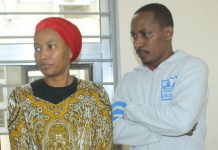AfricaPress-Tanzania: A RESIDENT of Arusha City, Yuda John, is to remain behind bars for 30 years for having sexual intercourse with his own seven-year old daughter repeatedly.
This follows the decision of the Court of Appeal to dismiss the appeal for devoid of merit under which John, the appellant, had lodged to challenge both conviction and the sentence imposed on him by the district trial court and confirmed by the High Court.
Justices Augustine Mwarija, Ignas Kitusi and Rehema Kerefu dismissed all grounds of appeal the appellant had advanced, holding that the first appellate court, the High Court, properly re-evaluated the evidence and was satisfied with the findings of the trial court.
“We do not find any cogent reasons to disturb the concurrent findings of the lower courts, as we are satisfied that the evidence taken as a whole establishes that the prosecution’s case against the appellant was proved beyond reasonable doubt,” they ruled.
During hearing of the appeal, the appellant had contended, among others, that the first appellate court failed to re-evaluate the evidence on record and that the victim of rape (name withheld) and her neighbour were not credible and reliable witnesses.
In their deliberations, the justices said that having revisited the testimonies of two witnesses, who testified during the trial, there was no doubt that they clearly explained the incident.
According to the justices, the victim, in particular, testified on how the appellant undressed himself and then undressed her by removing her underpants and raped her.
Likewise, they said, the victim’s neighbor testified on how she started living with her after finding that she was sexually abused by the appellant and how she examined and took her to the hospital for further medical examination.
“Pursuant to section 127 (7) of the Tanzania Evidence Act, as rightly submitted by (the prosecution), in cases involving sexual offences the best evidence is that of the victim.
The sole evidence of the victim can be safely relied upon by the court to sustain a conviction,” the justices recalled.
They were mindful of the fact that in his submission the appellant argued that the evidence of his daughter was not corroborated because the investigation officer and the doctor were not called to testify before the trial court. “We find this argument to have no legal basis.
As argued by (the prosecution, under section 143 of the Act, there is no legal requirement for the prosecution to call a specific number of witnesses,” they said.
The justices added that in rape cases, the testimony of the doctor or the PF3 are not the only evidence to prove rape and that other evidence on the record could as well prove the offence.
They hastened to remark that even without the evidence of the doctor or even the PF3, the testimony of the two witnesses was quite sufficient to prove that the daughter was raped.
“We are satisfied that both lower courts adequately evaluated the evidence on record and arrived at a fair conclusion. It is therefore, our settled view that there is no fault in the factual findings of the two courts below for this Court to interfere,” the justices said. The victim was living with her father and her step mother together with a young baby.
On the fateful date, when the step mother went out to buy vegetables and asked the victim to take care of the baby, her father undressed himself and then undressed her by removing her underpants and raped her.
She had told the court that, after the incident she went to the house of a neighbor, but she did not reveal the ordeal to her or even to anyone.
However, on the next day, the daughter told the neighbor what had befallen her and that the father had raped her twice. The matter was reported to the ten-cell leader who did not take any action. And, the neighbour decided to inform her fellow women and the appellant was arrested.







